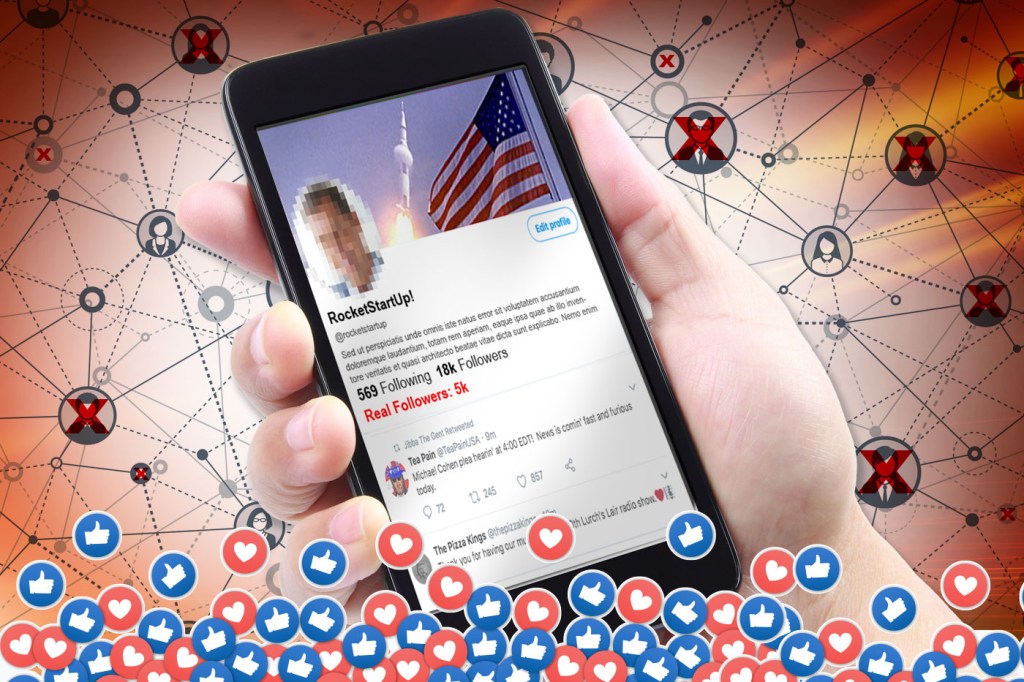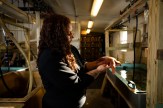Will fake social media followers derail the booming influencer marketing business?

Celebrities, social media stars, and other online personalities have taken a hit to their credibility in recent months, as millions of their followers have been exposed as fake or bought. This has created a bigger problem for advertisers and consumers, who no longer can trust in high follower numbers as a measure of influence and credibility.
Now, a machine-learning algorithm developed by Northeastern graduates is giving marketers a way to keep their advertising real—and rebuild consumer trust. Brands have always sought celebrity endorsements, but the mass adoption of social media has given rise to a new kind of endorser: the influencer, an online personality with a large number of followers.
“Influencers are a whole new kind of currency,” said Lyle Stevens, chief executive officer for Mavrck, an influencer marketing firm in Boston that he founded with two other Northeastern graduates, Sean Naegeli and Chris Wolfel.
The company’s influencer marketing platform is used today by P&G, PepsiCo, and other major consumer brands. Big brands such as these use influencers to push their products. Mavrck built a platform that allows brands to tap into their social networks and identify influencers who can then be inspired to share relevant content in their newsfeeds. Identifying whether influencers have an inflated number of followers is one of the many tools the platform provides.
When social media personalities who promote products bolster their numbers with fake followers, they create an illusion of popularity, and with it an illusion of their ability to influence consumers’ buying choices, putting the entire field of influencer marketing into question. At a time when consumers trust each other’s opinions more than they trust brands, Stevens sees this issue of credibility as “a lynchpin to unlocking the full potential of influencer marketing.”
Mavrck’s new fraud detection algorithm works by analyzing a statistically significant sample of an influencer’s followers, as well as accounts that ‘like’ or comment on that influencer’s posts. The algorithm gauges whether an account is being run by a real person or operated by a bot to create artificial followers, likes, and comments. This kind of analysis helps marketers automate the process of weeding out those accounts that are likely to have purchased followers or engagements.
Influencers are a whole new kind of currency.
Lyle Stevens, Chief Executive Officer for Mavrck
Until now, much of this work has been done manually, but the explosive growth of influencer marketing makes it virtually impossible to evaluate every potential influencer for having fake or purchased followers. Last year, according to Stevens, Instagram and Twitter saw more than 21 million posts featuring sponsored content—a number that continues to grow, with increasingly steep spikes in sponsorships during the holidays.
In its analysis of nearly 4,000 Instagram users with at least 5,000 followers each, Mavrck found that almost 10 percent had bought followers or engagements.
But just how big is the problem of influencer fraud? Last month, Twitter began removing millions of suspicious accounts from its users’ follower base, and in June Unilever’s chief marketing officer, Keith Weed, said the consumer goods giant would no longer work with influencers who purchased followers.
The Federal Trade Commission is watching, too. The consumer-protection agency last year issued stern warnings to social media influencers and brands for not making it obvious that the influencers were being paid to endorse products and services. While the commission has not specifically weighed in on the issue of fake followers, its guidelines do comment on fraudulent “liking” of products and services. “If ‘likes’ are from non-existent people or people who have no experience using the product or service, they are clearly deceptive, and both the purchaser and the seller of the fake ‘likes’ could face enforcement action,” according to the guidance published on the commission’s website.
According to Mavrck and other industry observers, the influencer marketing fraud problem is only going to get worse without action—and fast. Forecasts say the $1 billion sector may blossom into a $5 billion to $10 billion industry by 2022.

From left to right: Sean Naegeli, Lyle Stevens, and Chris Wolfel. Photo courtesy of Mavrck.
Unfortunately, technology such as Mavrck’s fraud detection tool isn’t a panacea. Northeastern marketing professor Koen Pauwels, who studied the relationship between social media and consumer trust, said part of the problem is in the metrics advertisers use to measure success.
“There is evidence that the follower metric is not reliable, as some influencers cheat a lot more than others,” he said. “In reality, there is a strong need for the industry to self-check in order to keep its credibility.”
Like moths to a flame, fake followers will latch on to the biggest and most popular social media accounts naturally, with up to 10 percent of followers netting out as fake. This, according to Stevens, means the industry must be careful to not accuse every social media account with fake followers of fraud. He believes the industry needs some agreed-to standard in evaluating influencers’ authenticity—the equivalent of a credit score database. Lacking that, “It may have to be a third party like the FTC that has to step in.”
Still, the Mavrck founders consider the firm well-equipped to lead the industry’s dialogue about influencer marketing fraud. Roughly one-third of Mavrck’s 30 employees come from Northeastern, which company co-founder Wolfel said is not surprising.
“Northeastern breeds a different kind of person,” he said, describing the Mavrck team as “curious hustlers” who are highly driven by their curiosity. “It’s instilled in your behavior at Northeastern.” Wolfel serves as an advisor for IDEA, Northeastern’s student-led business incubator, which helped launch Mavrck four years ago with early funding.
“Northeastern taught us to look for people with different skills and perspectives,” added Naegeli, the company’s chief influencer officer, noting that diversity in perspectives is what allows the entrepreneurial team to challenge each other and grow.





